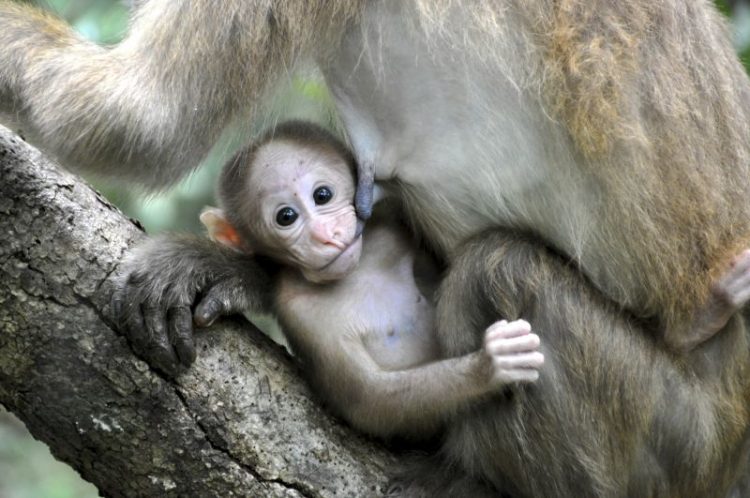Prenatal stress accelerates growth and inhibits the motoric development of unborn monkeys

An infant Assamese macaque being nursed in the hill evergreen forest of Thailand. Photo: Andreas Berghänel Foto: Andreas Berghänel
At their field station in Thailand, researchers of the German Primate Center – Leibniz Institute for Primate Research (DPZ) and the University of Göttingen followed non-human primate mothers through their gestation and their infants through the first one and a half years of their lives.
The offspring of mothers that were stressed from food shortages grew faster than their peers but paid for that with slower motoric development and probably also a weakened immune system. This is the first study on the effects of prenatal stress in long-lived mammals in their natural habitat. The results support the theory that stressed mothers change their unborn’s pace of life (Proceedings of the Royal Society B 20161304).
It is a known fact that maternal stress often has a long-term impact on the unborn child.
Yet, physicians and biologists still discuss as to whether these maternal influences should generally be regarded as pathological or as to whether it is an evolved adaptative mechanism. Are mothers able to program their unborn offspring to increase its evolutionary fitness?
This hypothesis is supported by studies on short-lived mammals such as rats, since the environmental conditions during gestation are very similar to those the offspring will breed in a few month later. The new study suggests that adaptive prenatal stress effects can also occur in long-lived monkeys.
The physiological stress following natural food shortages seemed to have cause accelerated growth among young macaques as evident from the analysis of data on fruit availability in the most important tree species, hormone levels in the feces of mothers and growth curves derived from hundreds of photos of Assamese macaque infants in the hill evergreen forest of northeastern Thailand.
In mammals growth is usually closely related to important developmental milestones. The first author of the study, Andreas Berghänel, explains, “A shortened life expectancy caused by prenatal development disturbances here leads to an accelerated pace of life. The offspring grows faster and reaches sexually maturity quicker allowing for earlier and faster reproduction.”
Even in humans, early life adversities are related to earlier sexual maturity. Nevertheless, Julia Ostner, the head of the field project, is surprised, “The faster pace of life is astounding. We expected that the poor conditions experienced in the womb would have only negative consequences for the young during the gestation period.”
And indeed, accelerated growth is only one of the consequences of reduced food availability and an increased glucocorticoid level. Offspring exposed to these conditions showed delayed motoric development and took longer to learn how to dangle from a branch on one leg, to jump backwards or to leap at least five meters far in the canopy of the forest. When an outbreak of conjunctivitis occurred, the external signs were noticed in the infant the longer, the more stress their mothers experienced during gestation. Thus, also the immune system seems to be affected.
It remains unclear whether the prenatal stress also affected the cognitive development of the offspring. Further investigations are needed to determine whether adverse prenatal conditions increase reproductive rates of macaques and reduce their longevity, as predicted by the hypothesis of the internal adaptive response.
Original Publication:
Andreas Berghänel, Michael Heistermann, Oliver Schülke and Julia Ostner (2016): Prenatal stress effects in a wild, long-lived primate: predictive adaptive responses in an unpredictable environment. Proceedings of the Royal Society B. 20161304.
http://dx.doi.org/10.1098/rspb.2016.1304
Contact and notes for editors:
Andreas Berghänel
Tel: +49 176 2112 3898
E-mail: abergha@gwdg.de
Luzie Almenräder (Communication)
Tel: +49 551 3851-424
E-mail: lalmenraeder@dpz.eu
Printable pictures are available in our Media library. We kindly request a specimen copy in case of publication.
The German Primate Center (DPZ) – Leibniz Institute for Primate Research conducts biological and biomedical research on and with primates in the fields of infection research, neuroscience and primate biology. The DPZ maintains four field stations in the tropics and is the reference and service center for all aspects of primate research. The DPZ is one of 88 research and infrastructure facilities of the Leibniz Association.
Media Contact
More Information:
http://dpz.eu/All latest news from the category: Life Sciences and Chemistry
Articles and reports from the Life Sciences and chemistry area deal with applied and basic research into modern biology, chemistry and human medicine.
Valuable information can be found on a range of life sciences fields including bacteriology, biochemistry, bionics, bioinformatics, biophysics, biotechnology, genetics, geobotany, human biology, marine biology, microbiology, molecular biology, cellular biology, zoology, bioinorganic chemistry, microchemistry and environmental chemistry.
Newest articles

NASA: Mystery of life’s handedness deepens
The mystery of why life uses molecules with specific orientations has deepened with a NASA-funded discovery that RNA — a key molecule thought to have potentially held the instructions for…

What are the effects of historic lithium mining on water quality?
Study reveals low levels of common contaminants but high levels of other elements in waters associated with an abandoned lithium mine. Lithium ore and mining waste from a historic lithium…

Quantum-inspired design boosts efficiency of heat-to-electricity conversion
Rice engineers take unconventional route to improving thermophotovoltaic systems. Researchers at Rice University have found a new way to improve a key element of thermophotovoltaic (TPV) systems, which convert heat…



